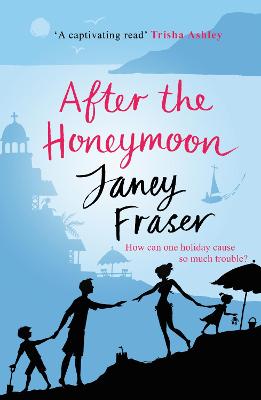Reviewed by Leah on
Probably my favourite part of After The Honeymoon was the Greek setting. It sounded like the most idyllic place to live – barring the fact you can’t flush loo paper down the toilet which is quite simply disgusting in the extreme. Villa Rosa sounded like such a lovely, quaint place to stay and if all the guests (namely Melissa’s two kids!) hadn’t caused such a rucus, I could totally see the appeal and why it was popular. I didn’t mind the characters too much – I really liked Rosie, the owner of Villa Rosa, and I adored her son, Jack, who was the modest, likeable 15-year-old any mother would be proud to call their own! I did think the book started slowly, but as the secrets unravel and the in-fighting between all the couples begin, the novel does pick up some pace, although I did perhaps think it was a bit too much to shove into the last quarter of the book…
The real problems I had with After The Honeymoon were the other characters. Emma and Tom are supposed to be on their honeymoon, yet Tom spends the entire honeymoon laid up in bed, allegedly sick. It confused me that Emma was so willing to just let him rot in bed the whole week. It was RIDICULOUS. I was embarrassed on her behalf. But, I was also embarrassed by Emma, too. It’s the first time she’s left her kids (which I understand) but she treats her mother, who’s looking after the kids, as if she’s incapable of doing it, and is always ringing and worrying and ringing and worrying some more. She frustrated the life out of me with her actions. I really wanted to like Winston, too, but he was just rude and awful, consistently whinging about Melissa’s two kids (who were brats, I absolutely stand by him in that regard) but he knew that getting into his marriage and he still got married, so he should have shut his mouth and got on with it.
I also personally found the writing quite jarring and clunky. The novel doesn’t flow like most novels do. The novel is written in third-person, but it just felt wrong, switching from Emma, to Winston, to Rosie, with no rhyme or reason. It should have been like a helicopter view of them all, not separate entities. I also found the novel quite repetitive – Emma is always described as “moon-faced” and “plump”, whenever Winston saw her that’s how he described her and I wanted to punch him in the face. I really wanted to love the novel – Janey is a popular author, but this wasn’t really the novel for me. Many others will enjoy it, but it wasn’t really the read for me, which is a shame.
Reading updates
- Started reading
- 28 May, 2014: Finished reading
- 28 May, 2014: Reviewed
